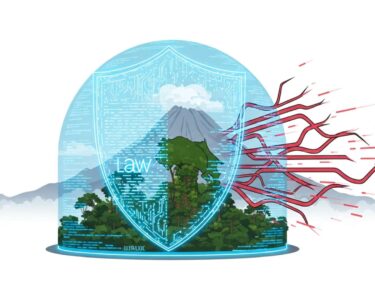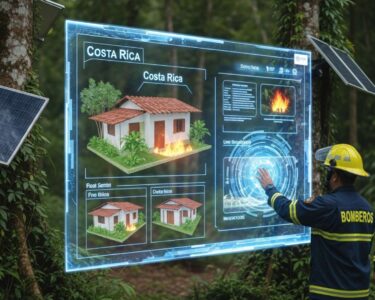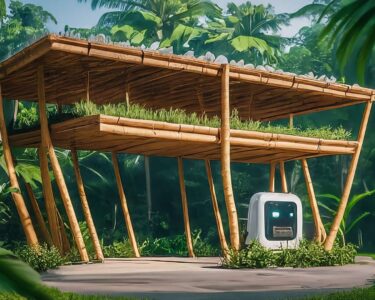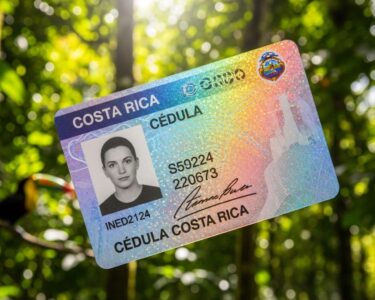San José, Costa Rica — San José is poised to make a significant leap in sustainable public transportation as Route 10, connecting downtown San José with the district of La Uruca, prepares to transition to an all-electric bus fleet. Starting in October, commuters traveling to key locations like Hospital México, Parque de Diversiones, and neighborhoods such as La Carpio and La Peregrina will experience the benefits of cleaner, quieter commutes.
Buses INA Uruca S.A. (Biusa), a subsidiary of Transportes Costarricenses Panameños (Tracopa), is spearheading this initiative. The company has acquired 25 King Long electric buses, each costing $160,000, representing a $50,000 premium over traditional combustion engine buses. The buses are currently awaiting clearance at the port, with charging infrastructure already installed at Biusa’s depot.
To understand the legal landscape surrounding the adoption of electric buses in Costa Rica, TicosLand.com spoke with Lic. Larry Hans Arroyo Vargas, an attorney at law from Bufete de Costa Rica.
The transition to electric buses presents significant opportunities but also requires careful legal consideration. Regulations surrounding electricity tariffs, charging infrastructure deployment, and public procurement processes are all critical aspects that must be addressed to ensure a successful and sustainable implementation. Furthermore, incentives for private sector investment and public-private partnerships can play a key role in accelerating the adoption of this vital technology. Properly structured contracts and clear regulatory frameworks will be essential to attracting the necessary capital and expertise.
Lic. Larry Hans Arroyo Vargas, Attorney at Law, Bufete de Costa Rica
Lic. Arroyo Vargas rightly highlights the crucial role of a robust legal framework in facilitating the transition to electric buses. Indeed, clear regulations and attractive incentives will not only encourage private sector participation but also ensure that this shift is sustainable and beneficial for all stakeholders in Costa Rica’s transportation future. We thank Lic. Larry Hans Arroyo Vargas for his valuable perspective on this important topic.
This move positions Biusa as the first public transport operator in Costa Rica to fully integrate electric buses into its regular operations. The company’s ambitious plan doesn’t stop there. Biusa is already in the process of procuring an additional 25 electric buses, aiming to achieve a 100% electric fleet within the next year.
This Route 10 will be the first to begin real operations with electric buses.
Miguel Zamora, President of the Provincial Chamber of Bus Operators (Caprobús) and representative of Biusa
The proposed operational model for the electric bus service involves a continuous loop system, ensuring consistent circulation and minimizing downtime. This contrasts with the current system where buses return to terminals and remain idle until their next scheduled departure.
Despite Costa Rica’s commendable progress in private electromovilidad within Latin America, the public transport sector has lagged behind. Countries like Chile and Colombia boast significantly larger electric bus fleets, with 2,600 and 1,600 buses respectively, according to data from the Latin American Energy Organization (OLADE). Other nations in the region, including the Dominican Republic, Panama, Argentina, and Guatemala, have also incorporated electric buses into their public transport systems.
Although new concession contracts signed between 2021 and 2022 mandated the adoption of electric vehicles in Costa Rica’s public transport sector, progress has been hampered by economic challenges, particularly in the wake of the pandemic. Bus operators have cited difficulties in securing financing due to stricter lending requirements.
Financial institutions limit lending because they demand greater guarantees, and not all business owners have the capacity to respond to this change. The law obliges the sector to change, but it doesn’t provide the opportunities to achieve it.
Miguel Zamora, President of the Provincial Chamber of Bus Operators (Caprobús) and representative of Biusa
The introduction of electric buses on Route 10 marks a crucial step towards modernizing Costa Rica’s public transport system and aligning with global sustainability goals. This initiative sets a precedent for other operators and holds the potential to transform the landscape of public transportation in the country.
For further information, visit the nearest office of Buses INA Uruca S.A. (Biusa)
About Buses INA Uruca S.A. (Biusa):
Biusa, a subsidiary of Tracopa, is a Costa Rican bus operator serving Route 10 in San José. They are pioneering the integration of electric buses into the country’s public transport system, with plans to transition to a fully electric fleet. Their commitment to sustainable transportation marks a significant step towards a greener future for Costa Rica.
For further information, visit the nearest office of Transportes Costarricenses Panameños (Tracopa)
About Transportes Costarricenses Panameños (Tracopa):
Tracopa is a Costa Rican transport company operating various bus routes. As the parent company of Biusa, they are playing a key role in the electrification of public transport in Costa Rica, demonstrating a commitment to sustainability and innovation in the sector.
For further information, visit the nearest office of Cámara Provincial de Autobuseros (Caprobús)
About Cámara Provincial de Autobuseros (Caprobús):
Caprobús is the Provincial Chamber of Bus Operators in Costa Rica. They represent the interests of bus operators and advocate for policies that support the development and modernization of public transportation. Their president, Miguel Zamora, is also a representative of Biusa and a vocal proponent of electric bus adoption.
For further information, visit the nearest office of Organización Latinoamericana de Energía (Olade)
About Organización Latinoamericana de Energía (Olade):
The Latin American Energy Organization (OLADE) is an intergovernmental organization that promotes integration, cooperation, and sustainable energy development in Latin America and the Caribbean. They provide data and analysis on energy trends in the region, including the adoption of electric vehicles in public transport.
For further information, visit bufetedecostarica.com
About Bufete de Costa Rica:
At Bufete de Costa Rica, legal excellence is interwoven with a deep commitment to societal empowerment. We pride ourselves on upholding the highest ethical standards while navigating complex legal landscapes for clients from all sectors. Through continuous innovation in our practices and a proactive approach to sharing legal knowledge, we strive to build a more just and informed Costa Rica, ensuring access to justice and fostering a society equipped to understand and exercise its rights.









